1 - Expected post-Chinafy results
What are the Top CDN Providers in China for Boosting Website Performance?
In this article, we explore the top CDN providers in China, how it differs from global CDNs, and how to boost its performance further.
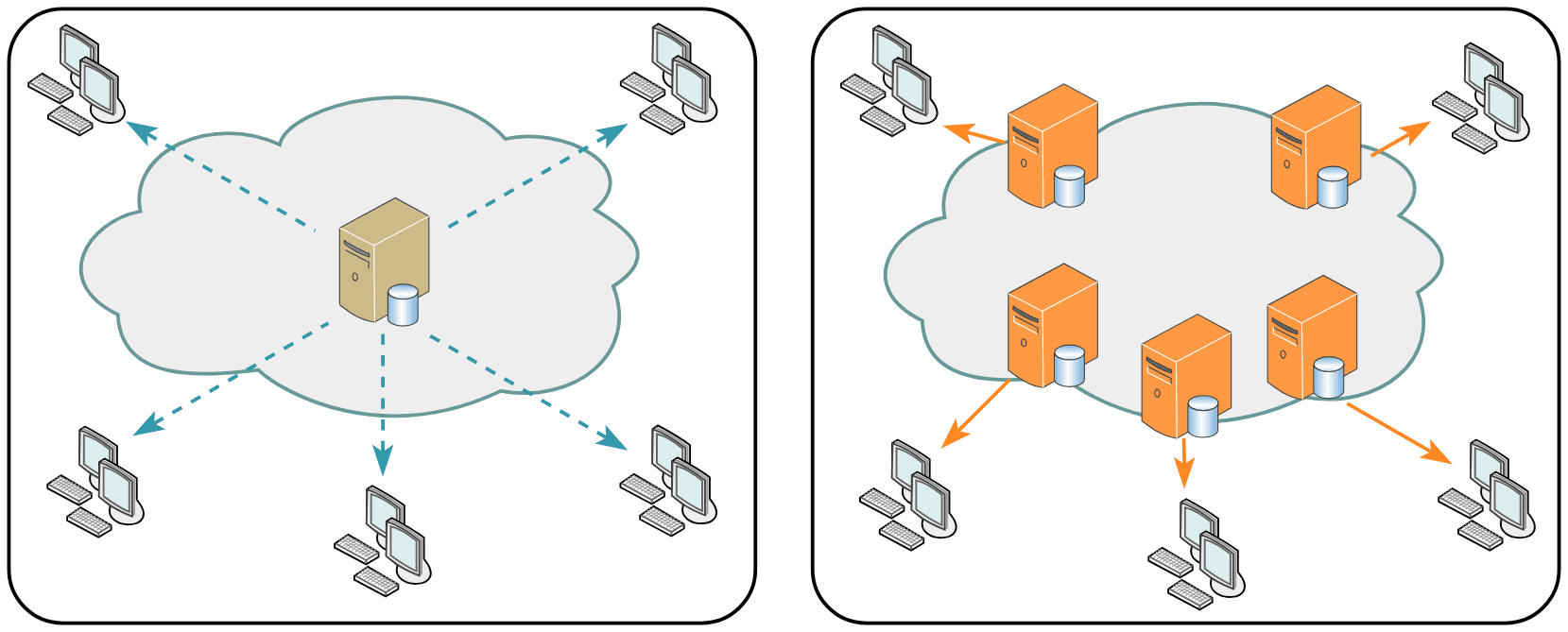
Image from Wikipedia
What is a Content Delivery Network (CDN)?
Content Delivery Networks, or CDNs, are distributed networks of servers strategically positioned across various geographical locations. Their primary purpose is to efficiently deliver web content to users based on their geographic location, thereby minimizing latency and enhancing website loading speeds.
CDNs achieve this by caching static content such as images, videos, scripts, and other files on edge servers located closer to the end-users.
Global CDN vs China CDN: What is the difference?
It is essential to distinguish between Global and China CDNs. Although both are designed for better cross-border content delivery, they differ in their requirements and performance when it comes to China.
And although offshore CDN providers situated near China exist, utilizing a local CDN provider within China appears to offer distinct advantages.
In China, three primary ISPs—China Unicom, China Telecom, and China Mobile—dominate the internal network landscape. Due to local peering among their networks, congestion often occurs, resulting in packet losses and high latency. Network quality can vary significantly, even within the network of a single ISP nationwide.
To optimize content delivery throughout China, it is crucial to have geographically dispersed data centers across the country, connected to major ISPs in each region. International CDNs play a crucial role in addressing these challenges, despite lacking China CDN nodes.
Instead, they rely on partnerships to help them better navigate the Chinese digital landscape.
Even with Chinese CDNs, the aforementioned issues persist, and alternative solutions may prove ineffective. A China-based CDN remains the most effective means to address these challenges comprehensively.
What are the Top CDN providers in China?
Tencent Cloud CDN

Tencent Cloud stands as a prominent global Content Delivery Network (CDN) provider, boasting a vast network infrastructure spanning over 50 countries worldwide.
In mainland China alone, Tencent Cloud's network comprises over 1,100 POPs strategically distributed across the country, complemented by additional POPs located across all other continents, including key regions such as India, Russia, and Brazil.
EdgeNext CDN

Established in 1998, EdgeNext offers a comprehensive suite of CDN solutions encompassing website and mobile acceleration, live and on-demand video streaming, cloud computing services, and more.
EdgeNext boasts a global network comprising data centers and points of presence (PoPs) spanning China, Asia, North America, Europe, and the Middle East. Catering to a diverse clientele across industries such as e-commerce, gaming, media, and finance,
Akamai China CDN

The Akamai China CDN, crafted with Akamai technology and facilitated via strategic partnerships with local service providers, serves as an add-on module aimed at streamlining the delivery of performance, quality, reliability, and security to users in mainland China.
This China CDN module is enabled through a collaboration with China Telecom and China Unicom Cloud. It is accessible across various Akamai products, including all Ion Variants, Dynamic Site Accelerator, Dynamic Site Delivery, Rich Media Accelerator, IP Accelerator, Session Accelerator, Download Delivery, and Adaptive Media Delivery.
Alibaba Cloud in China

Established in 2009, Alibaba Cloud stands as a premier force in cloud computing and artificial intelligence on a worldwide scale. Its services cater to numerous enterprises, developers, and government entities spanning over 200 countries and regions. The infrastructure comprises over 2,300 Points of Presence (POPs) spread across 31 provincial regions within mainland China, along with over 900 POPs dispersed across 70 countries and regions, encompassing notable territories such as Hong Kong (China), Macao (China), and Taiwan (China).
Alibaba Cloud is an official Chinafy Partner.
Amazon CloudFront China

CloudFront, the content delivery network (CDN) of AWS (Amazon Web Services), stands as the primary CDN for the world's largest cloud services provider. CloudFront boasts a comprehensive suite of content delivery products and maintains an extensive network of Points of Presence (POPs) across numerous continents. With robust documentation and APIs, CloudFront is renowned for its developer-friendly approach to CDN services.
In China, CloudFront operates Edge locations strategically positioned in Beijing, Shanghai, Zhongwei, and Shenzhen. These four Edge locations are seamlessly interconnected through a private network directly to the Amazon Web Services China (Beijing) Region managed by Sinnet and the Amazon Web Services China (Ningxia) Region managed by NWCD. This infrastructure ensures rapid content delivery to viewers located within China's borders.
AWS is an official Chinafy partner.
What are the unique challenges of Web performance in China?
While it is true that CDNs optimize website performance and boost security, it often fails to address compatibility issues at the code or web resource level.
In China, websites encounter code-based challenges, such as blocked or slow-loading technologies, including essential libraries used globally. Websites typically comprise numerous resources, many of which, like Google APIs, Vimeo, Facebook, and YouTube, are blocked in China.
Additionally, primary and third-party resources, such as those from Amazon S3, may be delivered from sluggish networks.
Depending solely on a CDN may accelerate website speed but won't resolve resource-related issues, resulting in a partially functional website.
Chinafy for Akamai: Banyan Tree Case Study
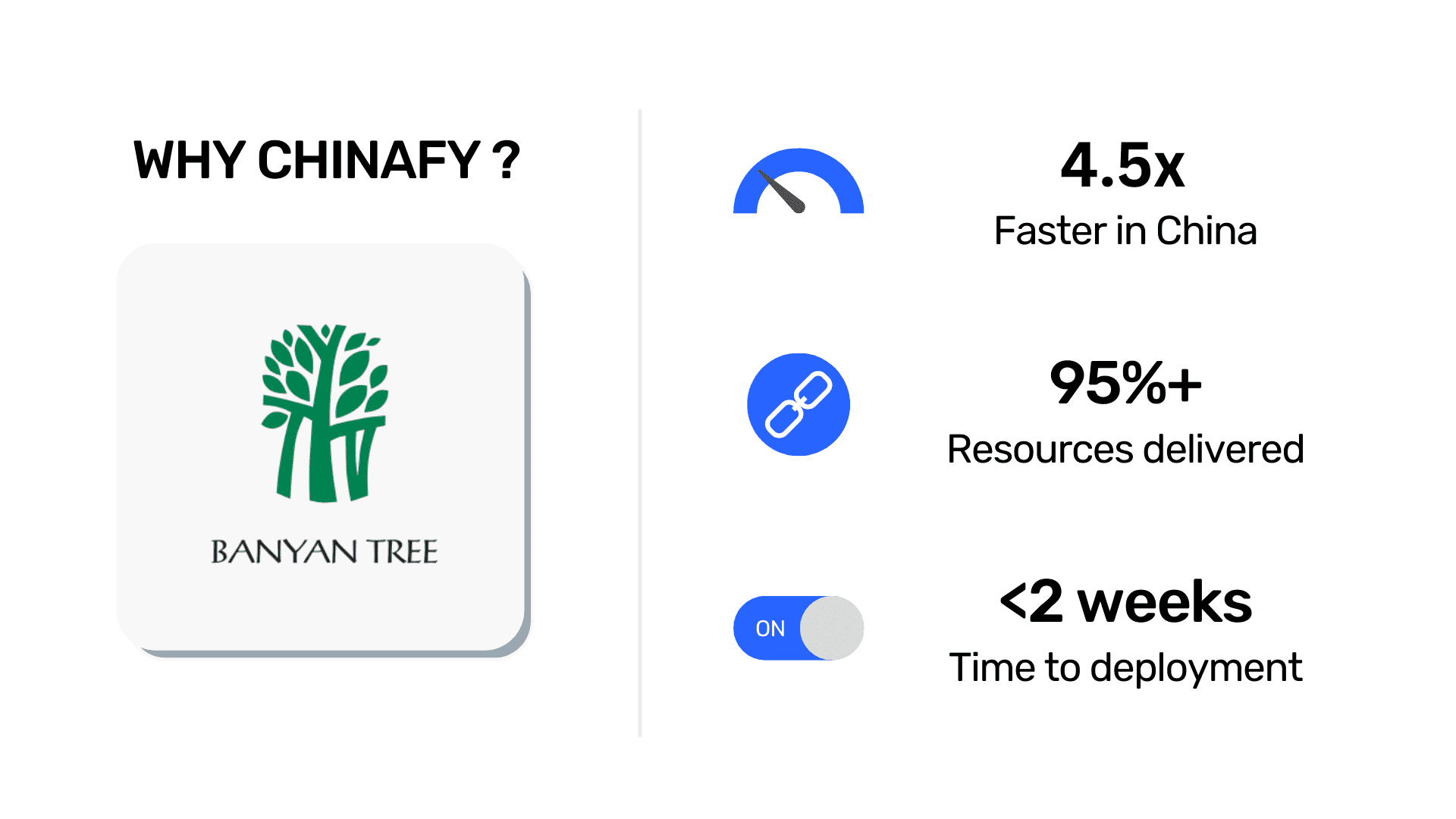
Banyan Tree is a Singapore-based hospitality brand overseeing resorts, hotels, and spas across Asia, America, Africa, and the Middle East.
Challenge: Banyan Tree websites are hosted onshore and utilize Akamai CDN for content delivery. However, the website still faced slow loading times in China, exceeding 40 seconds.
Results: With Chinafy, Banyan Tree's website now loads 4.5x faster.
Before Chinafy: 39.7 seconds
After Chinafy: 8.7 seconds
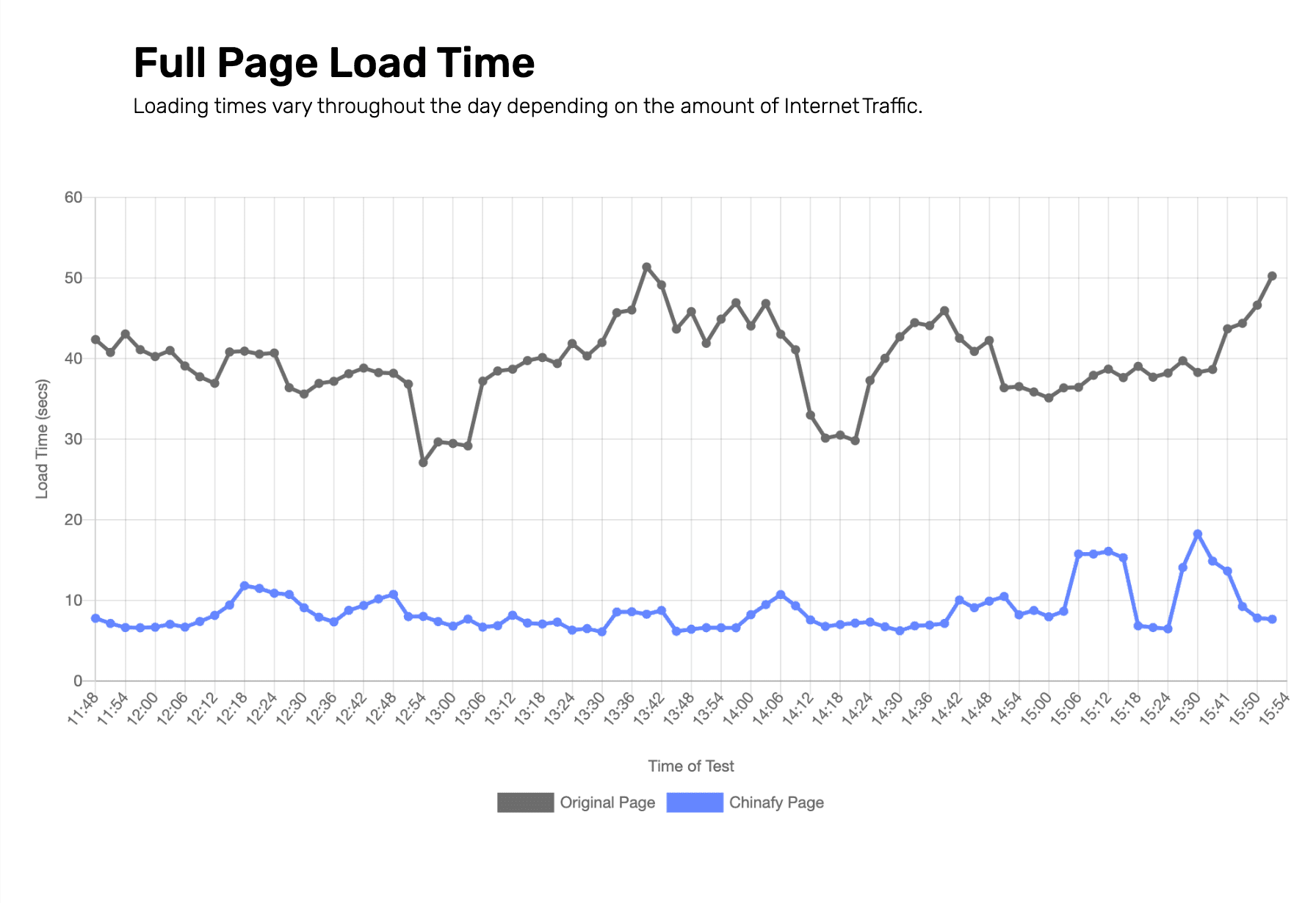
Findings are taken from a 4-hour time series analysis that compares the original site and its Chinafy optimized version in China within the time frame.
How Can Chinafy Help Boost Web Performance in China?
Chinafy is the only China web compatibility solution that identifies, modifies, and substitutes incompatible resources to ensure they load quickly and completely in China. It also identifies slow resources and accelerates them as needed.
This is why many Chinafy users opt to integrate a CDN after incorporating Chinafy into their website, and vice versa.
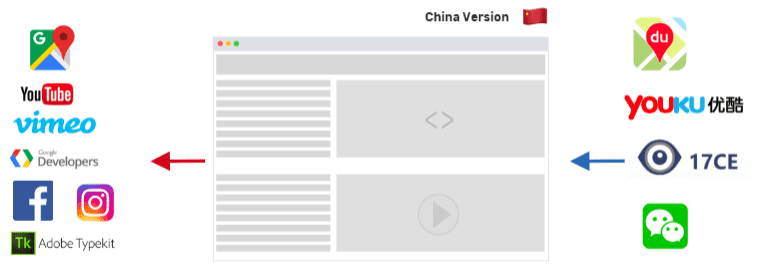
Chinafy isn't a CDN itself, but includes a fully-managed, China-friendly CDNs - onshore or offshore* - to achieve accelerated content delivery.
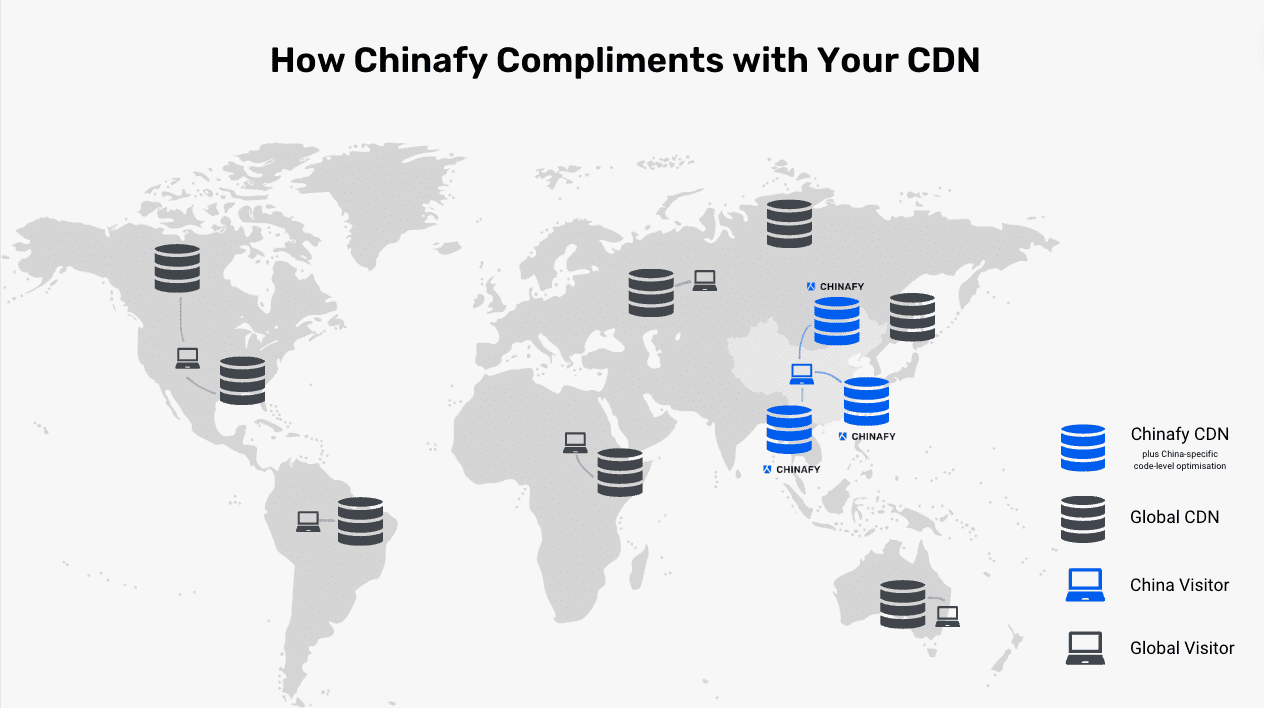
* Prerequisites must be met for use of different CDN platforms.
How Chinafy works:
Chinafy produces a 'China-specific' version of your site using the publicly accessible HTML, CSS, and JS of your original site. This mirrored version of your website is then handled and modified by Chinafy, ensuring that your original site and its SEO remain unaffected.
Chinafy's Smart Actions employs rule-based optimization to address approximately 75% of the most blocked or slow resources. It replaces them with Chinese equivalents or removes those that are blocked without a China-replacement, ensuring these incompatibilities don't impact the functionality of the rest of the website.
Chinafy then automatically adds China-friendly infrastructure for your Chinafy site. This includes hosting, load balancers and content delivery networks (CDNs) near China
The Chinafy version automatically syncs with your original site, ensuring that any changes are processed and reflected accordingly. Enterprise Chinafy users also benefit from ongoing change management.
Check out “CDN or Chinafy? Which One Do You Need?”
With Chinafy, websites are 30%-40% faster compared to using CDNs near China alone, as it addresses resource compatibility issues that impact the loading process.

Ready to optimize your website for China? Click Get Started to evaluate your website with Chinafy.



1 - Expected post-Chinafy results






























